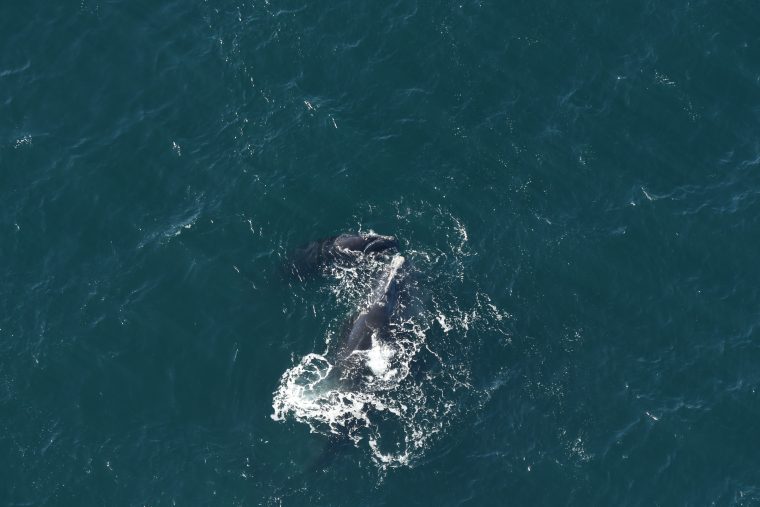Rare sighting provides crucial information to help protect the critically endangered species’ habitat

BOSTON, MASS. (March 10, 2021) – For the first time this season, the New England Aquarium aerial survey team has spotted a North Atlantic right whale mother and calf in the waters south of Martha’s Vineyard, an uncommon sighting for this habitat.
**PHOTOS AVAILABLE HERE, WITH CREDIT TO NEW ENGLAND AQUARIUM**
Aquarium scientists Orla O’Brien and Katherine McKenna were conducting an aerial survey on March 7 when they spotted a small group of right whales about 20 miles south of the Vineyard. As they photographed the whales, they noticed the group included a mother and calf pair.
“As the pair surfaced, the calf remained in very close contact with mom as it circled around her. It was an incredible experience to document a mother and calf pair given how crucial they both are to the recovery of this critically endangered species,” said McKenna, a research assistant in the Aquarium’s Anderson Cabot Center for Ocean Life.
The Aquarium team identified the mother whale as Catalog #2420, who was first sighted with her newest calf on January 11 off Ponte Vedra Beach, FL. This is #2420’s fifth calf. She has been spotted several times over the years in the calving grounds off the southeastern United States, but this is only her second sighting with a calf in northern waters.
“With only four sightings north of the calving ground in 27 years, we know little about where this female right whale feeds. This recent sighting adds an exciting piece to that puzzle,” said Aquarium Senior Scientist Philip Hamilton.
The 37+-year-old whale is a rarity for the critically endangered species: She has no scars from entanglements, one of only 14% of the population—which numbers just 356 individuals—without such scars. This suggests she may feed in areas with less fishing activity.
The New England Aquarium regularly conducts aerial surveys south of Martha’s Vineyard and Nantucket, including waters slated for wind energy development. The surveys, supported by four offshore wind developers via the Massachusetts Clean Energy Center, help monitor changes in animal populations, identify various animal species, and recognize trends collected by standardized data over many years. It is uncommon to see right whale mother-calf pairs in the survey area, the last being in March 2019. In the past several years, the aerial survey team has started to document an increased use of southern New England waters by right whales. Determining how right whales are using their habitat and where they are provides crucial information that can be used to better protect the critically endangered species.
It is uncommon to see right whale mother-calf pairs in this survey area, the last being in March 2019. In the past several years, the aerial survey team has started to document an increased use of southern New England waters by right whales.
“The right whale population has experienced substantial shifts in distribution in the past decade,” said O’Brien, an assistant scientist at the Aquarium. “The increased use of this habitat by right whales is just part of the bigger story, and these sightings help put that together.”
Right whales have been on the move in recent weeks along the coast of the Atlantic Ocean. The National Oceanic and Atmospheric Administration (NOAA) has extended its volunteer speed restriction for boaters south of Nantucket through March 23 after the Aquarium survey team’s most recent right whale sightings. NOAA is encouraging mariners to avoid the area or reduce speeds to 10 knots or less while traveling through it.
For 40 years, the Aquarium’s Right Whale Research Program has extensively studied this critically endangered species. Scientists focus on solutions-based work, collaborating with fishermen on new techniques to reduce deadly entanglements in fishing gear, facilitating communication across the maritime industry to reduce vessel strikes, and working with lawmakers locally, nationally, and internationally to develop science-based protections for the whales.
MEDIA CONTACT:
Pam Bechtold Snyder – psnyder@neaq.org, 617-686-5068
